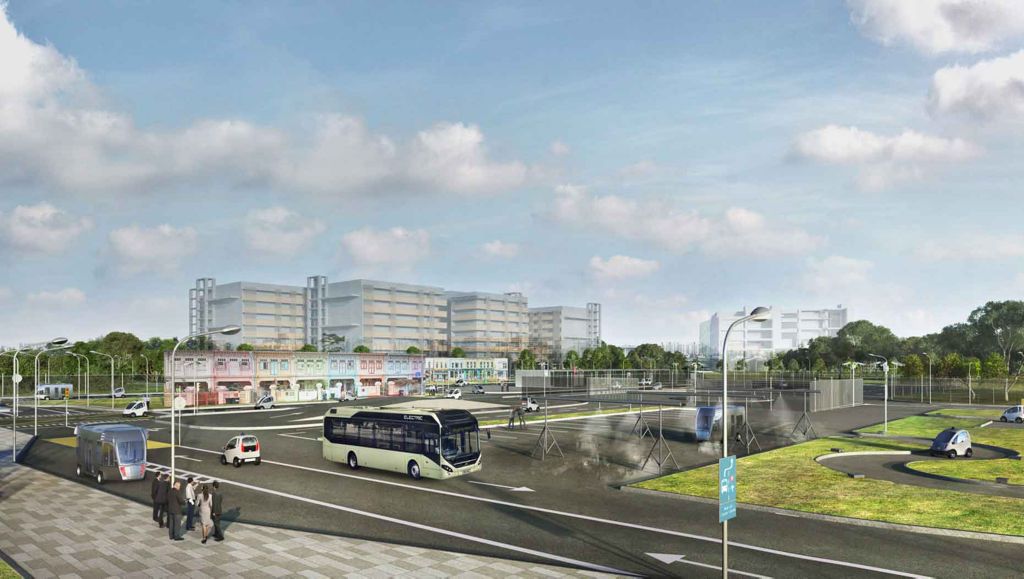Volvo and NTU to trial autonomous electric buses in Singapore


Singapore and its Land Transport Authority (LTA) are recognized for their focus on public transport and deployment of autonomous vehicles in the effort to create a sustainable city environment. Singapore has announced that self-driving buses will be deployed in several areas of the country by 2022.
For Volvo this will be the first autonomous application in public transportation. Volvo has already demonstrated the autonomous technology in mining, quarry and refuse collection operations.
“We are seeing fast-growing interest in both autonomous and electric vehicles in cities all over the world. Together with NTU, one of the world’s leading universities of technology, we now have the possibility of testing various solutions under realistic conditions in a major city that has high ambitions for its public transport,” said Håkan Agnevall, President Volvo Buses.
He added:
“We consider Singapore and NTU as excellent partners for Volvo, offering an enabling environment and complete ecosystem of research, development and implementation of new solutions. The technology developed in Singapore can contribute to future autonomous applications by Volvo Buses.”
The basis of the program consists of two all-electric 12-metre Volvo 7900 Electric buses, of the same type that Volvo Buses already delivers today. Volvo and NTU will build the autonomous driving solution on Volvo’s platform.
One of the autonomous electric buses in the program will be used on Singapore’s advanced new test facility for autonomous vehicles, CETRAN*, which was inaugurated in November 2017. Here, NTU’s researchers will in a fenced-off area be able to test new functionality and study how the bus interacts with other road-users in various conditions.
The second bus will be used for tests in the bus depot in partnership with the public transport operator SMRT. The aim is that tomorrow’s autonomous buses should be able to charge their batteries, drive through the depots to the vehicle wash and park – entirely autonomously.
NTU President Professor Subra Suresh, said, “Industry-academic connections are key in nurturing an environment which promotes innovation, research excellence, and technological change for a better tomorrow. NTU takes pride in its strong industry connections, and this partnership with Volvo will pave the way for future mobility solutions by developing and testing autonomous buses right here on campus. These solutions will further strengthen Singapore's vision of embracing autonomous vehicle technologies and enhance public transportation.”
“Our electric buses already make it possible for cities to improve their air quality and reduce noise levels. With our system approach to electromobility we in addition open up new ways for urban planning. When developing autonomous solutions for public transport we can really leverage the Volvo Group expertise in this rapidly developing technology field,” Håkan Agnevall said.
The cooperative program between Volvo Buses and NTU is now underway and will initially last for two years. The jointly developed autonomous electric buses will arrive into Singapore in the beginning of 2019.
Mr Desmond Kuek, President and Group Chief Executive Officer, SMRT Corporation, said:“Our goal is to stay future-ready by keeping abreast of latest land transport solutions for safe, efficient and comfortable journeys, and adapt such urban mobility solutions to Singapore’s unique operational setting. This MOU paves the way for SMRT, working with our partners, in hosting operational trials for autonomous buses, and the command & control system required for operating such smart vehicles. SMRT will leverage on decades of experience in operating and maintaining buses to lead the operational testing and evaluation of autonomous buses for their eventual safe deployment on our roads.”
Fast-charging stations based on the common OppCharge interface will be supplied by ABB. The OppCharge interface is very well suited for autonomous charging solutions in bus depots as well as in running traffic.
Commenting on the initiative, Frank Mühlon, Head of ABB’s Global Business for Electric Vehicle Charging, said: “Nanyang Technological University has estimated that electric vehicles could make up as much as 50 per cent of Singapore's motor population by 2050. ABB has long been at the forefront of developing greener solutions and we are proud to be helping make this vision become a reality.”
Volvo Buses is one of the world’s leading manufacturers of electrified buses and has thus far sold more than 3800 hybrid buses, electric hybrid buses and all-electric buses.
*Centre of Excellence for Testing and Research of Autonomous Vehicles
The autonomous Volvo 7900 Electric